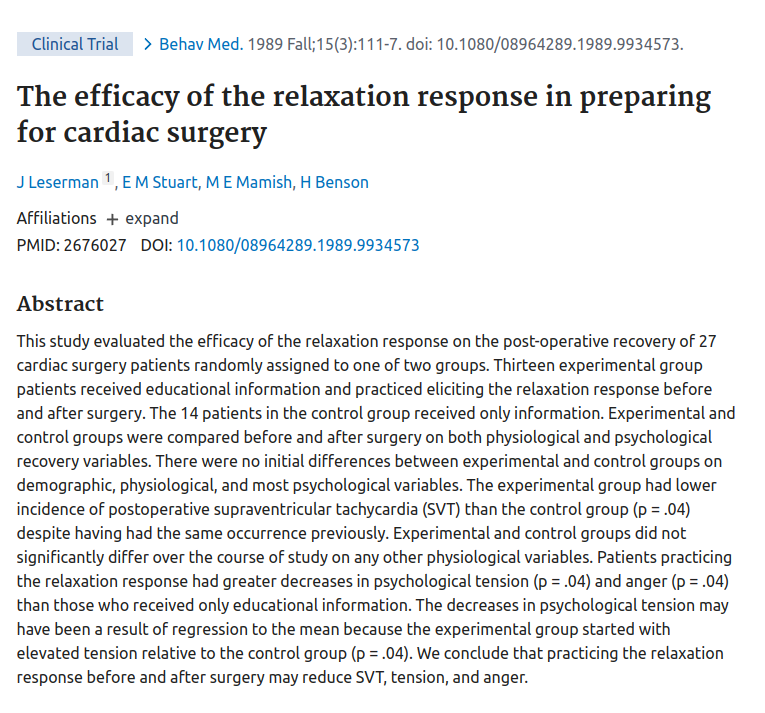This study evaluated the efficacy of the relaxation response on the postoperative recovery of 27 cardiac surgery patients randomly assigned to one of two groups. Thirteen experimental group patients received educational information and practiced eliciting the relaxation response before and after surgery. The 14 patients in the control group received only information. Experimental and control groups were compared before and after surgery on both physiological and psychological recovery variables. There were no initial differences between experimental and control groups on demographic, physiological, and most psychological variables. The experimental group had lower incidence of postoperative supraventricular tachycardia (SVT) than the control group (p = .04) despite having had the same occurrence previously. Experimental and control groups did not significantly differ over the course of study on any other physiological variables. Patients practicing the relaxation response had greater decreases in psychological tension (p = .04) and anger (p = .04) than those who received only educational information. The decreases in psychological tension may have been a result of regression to the mean because the experimental group started with elevated tension relative to the control group (p = .04). We conclude that practicing the relaxation response before and after surgery may reduce SVT, tension, and anger.
The Efficacy of the Relaxation Response in Preparing for Cardiac Surgery
Publication
Behavioral Medicine
Volume 15, Issue 3, 111-117
Abstract
Web and Email Links
Related Listings
Journal
Obstet Gynecol
During a 5-month study, we examined the effects of the relaxation response on premenstrual syndrome in 46 women who were randomly assigned to one of three groups: a charting group, a reading group, and a relaxation response group. The relaxation response group showed significantly greater improvement than the charting and the reading groups on physical symptoms (P less than .025 for both comparisons). There was a significant group-by-severity effect for charting versus relaxation resp […]
Journal
Am. J. Public Health
An experiment conducted at the corporate offices of a manufacturing firm investigated the effects of daily relaxation breaks on five self-reported measures of health, performance, and well-being. For 12 weeks, 126 volunteers filled out daily records and reported bi-weekly for additional measurements. After four weeks of baseline monitoring, they were divided randomly into three groups: Group A was taught a technique for producing the relaxation response; Group B was instructed to sit […]
Journal
Complementary Therapies in Medicine
Background Transcendental meditation (TM) is a stress reduction technique that can potentially lower blood pressure (BP) safely. The American Heart Association recommends that TM may be considered in clinical practice. Objective To provide an overview of all systematic reviews and meta-analyses of TM on BP for evidence-informed clinical decision making. Method Systematic searches of PubMed, EBSCOhost, Cochrane Library, Web of Science, Embase, and PsycINFO for all systematic rev […]

